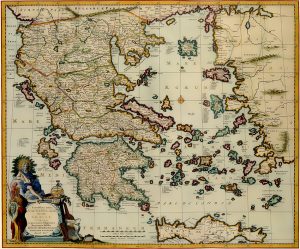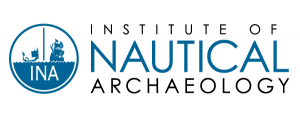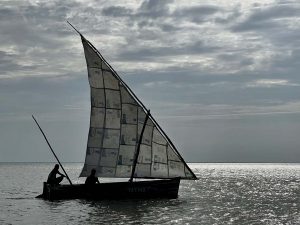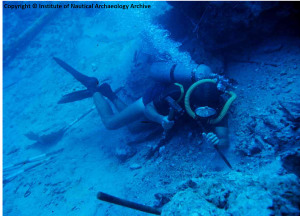ARIT-INA-KUDAR Public Seminar Series
We are pleased to announce a collaborative series of public online lectures between the American Research Institute in Turkey (ARIT), the Institute of Nautical Archaeology (INA), and KUDAR, focusing broadly on society’s relationship with the sea. With speakers ranging from post-graduate students to established academics, and an equally broad range of topics, this series hopes to bring new results, ideas, projects, and scholars to the public.
Upcoming Seminars:
Dr. Mark Lawall: The Long Voyage of the Kyrenia Amphoras, 1968 -2024 (September, 2024)
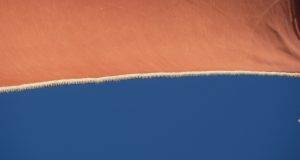
It is not often that CNN cares about the date of a shipwreck. The recent results of radiocarbon dating from the Kyrenia wreck, however, were of sufficient interest to launch the ship once more into broad public awareness, at least for a day or so. Those results suggested shifting the date of the wreck even further into the 3rd century BC – perhaps 286-278 BC – than had been suggested on the basis of the coins and the amphoras. Could this later date be correct and, if so, what are the implications for understanding the Kyrenia Ship as evidence for ancient shipping and trade?
This lecture addresses these questions through a review of how the dating of the amphora cargo has developed since it was first raised in 1968. As the suggested date for the cargo has shifted from the late 4th century to the 290s BC and now even later, the likelihood increases that some or many of the jars were already fairly old when they were used on the Kyrenia Ship. The various points of origin represented by the amphoras, their varying states of preservation (and possibly even states of completeness at the time of sinking), and the carefully documented evidence for the arrangement of the jars on the Ship all come together to shed light on this unique chapter of ancient economic history.
Past Seminars
Dr. Deborah Carlson: The Classical Shipwreck at Tektaş Burnu, Türkiye (January 26th, 2022)
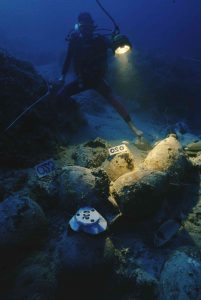
Our first lecture was on January 26th, 2022, from Dr. Deborah Carlson who discussed the 5th-century BC shipwreck excavated at Tektaş Burnu, Türkiye, with approximately 200 attendees from Europe and North America. Please follow this link to watch a recording of the presentation. Discovered by the Institute of Nautical Archaeology along the southern coastline of the Çeşme peninsula during their annual surveys, this wreck was excavated by an international team of archaeologists between 1999 and 2001. The excavation and study of this site has yielded new information on the production and distribution of amphorae from Erythrae, the carriage of various types of foodstuffs, and the only stratified examples of marble ophthalmoi – or ‘ship’s eyes’ – from a wreck site.
Dr. Alkiviadis Ginalis: The Byzantine Aegean, A Connecting Sea (October 20th, 2022)
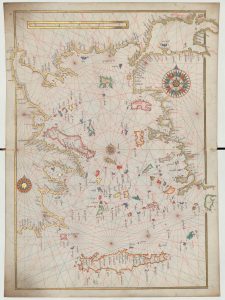
Our second collaborative seminar was on October 20th, at 19:00, from Dr. Alkiviadis Ginalis, Curator of Late Antique and Byzantine Archaeology at the German Archaeological Institute in Istanbul. Dr. Ginalis discussed how the Aegean Sea acted as a center of states and empires for millennia, and as a bridge, a transition, or a barrier for the complex coasts and islands that define it. For the Byzantine Empire, the sea was also a heartland, a link to an imagined and idealized past, and a geographic passage between the wider Mediterranean and the Black Sea. For the centuries between Late Antiquity and the Medieval era, however, these shifting values were accompanied by dramatic changes in the Byzantine Empire itself – constant shifts in its boundaries, and serious alterations in state structure, human activity, and settlement patterns. Characterized by its maritime environment, the different islands and coastal areas of the Aegean therefore played crucial roles in economic, social, cultural and political interactions.
Archaeological research has revealed a broad spectrum of material culture that sheds light on various aspects of life in the Byzantine-era Aegean, as well as its social landscape in this period of transformation. In particular, evidence about the development of seafaring and harbour infrastructure – as gateways for communication and movement into this mutable environment – offer unique insights about the increasingly complicated maritime world of Late Antiquity. To watch a recording of his lecture, please click here.
Dr. Mantha Zarmakoupi: The Maritime Infrastructure and Network of the Delian Emporium (December 6th, 2022)
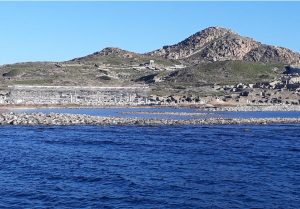
Delos underwent a rapid economic development after 167 BCE, when its Roman rulers granted the port of Delos ‘duty-free’ status under Athenian dominion and turned it into a commercial base connecting the eastern and western Mediterranean. The island became a free-trade commercial base under nominal Athenian supervision, but essentially under Roman rule. The result of this economic development was an unprecedented population increase and, by consequence, an accelerated urbanization – changes attested by the formation of new neighborhoods and harbor facilities and the redevelopment of existing urban and harbor areas of the island. This presentation will discuss the island’s urban development, maritime infrastructure and its commercial connections in order to shed light on this important key site in the history of Hellenistic Greece and the nascent Roman Empire. To watch a recording of this lecture, please click here.
Dr. Paul Salay: If it isn’t broke: Regional Shipbuilding Traditions and Maritime Networks in the Ancient Mediterranean (January 27th, 2023)

In his project, Dr. Salay applies the geo-spatial tools of Geographic Information Systems (GIS) to create a picture of the development and increasing complexity of maritime connectivity and transport from the Late Archaic to the Early Empire. From that foundation, he examines the evidence for several regional shipbuilding traditions, one in the Northwest Mediterranean, and the other in the Northern Adriatic, that are only recently becoming fully appreciated. In particular, he examines the question of how and why these regional shipbuilding traditions persisted, in some cases by more than a millennium, within the context of the tremendous growth and cosmopolitanism of the maritime cultural landscape in the ancient Mediterranean.
As evident in his presentation, he explores several inter-related questions. For example, what factors led to the adoption of new technology versus the retention of more established traditions? How did these various shipbuilding techniques respond to the pressures and influences of increasingly robust maritime transport networks? By asking such questions, he hopes to gain a fuller understanding of the complex and variegated ways that technological transfer took place, and to produce a more nuanced view of Mediterranean shipbuilding during this period.
Dr. Georgia Holly: Linking Nature and Culture for Sustainable Livelihoods: Establishing a Marine Protected Area around Mozambique Island. (May 9th, 2023)
On May 9th, 2023, Dr. Georgia Holly discussed the preliminary results from the innovative project based at the University of Edinburgh, “Linking Nature and Culture for Sustainable Livelihoods: Establishing a Marine Protected Are at the Island of Mozambique”. Available at this link, Georgia highlighted the links between the marine environment, shipwrecks, living heritage, and community on the Island of Mozambique, by presenting early survey results from the most recent field season in March, 2023. Lessons learnt in combining scientific and traditional knowledge within environmental management practices in the Global South were shared, alongside the potential for biocultural heritage to play a defining role in both heritage and biological conservation.
Dr. Emre Kuruçayırlı: Insight into Production and Maritime Trade of Metals 3200 Years Ago: New Studies on the Cape Gelidonya Shipwreck (November 10th, 2023)
The archaeological significance of the discovery and excavation of the Cape Gelidonya shipwreck near Kumluca on the southwest Anatolian coastline is multifold. First, dating to the end of the Bronze Age (ca. 1200 BC), it is one of the very few excavated shipwrecks from the Bronze Age Mediterranean. Second, with its raw copper ingots and scrap copper alloy artifacts, the ship’s cargo constitutes one of the largest metal assemblages from the Bronze Age, making it one of our most valuable sources of information on the production and trade of copper and bronze, the most crucial raw materials of the period. Finally, the excavation of the wreck in 1960 by George Bass was the first complete recovery of a shipwreck, and the first direct application of the methodologies of terrestrial excavations under the water, marking the birth of underwater archaeology as a new research discipline. In this paper, we presented the preliminary results from a recent research program on the metal cargo of the Cape Gelidonya shipwreck, incorporating typological investigations, 3D object modelling and archaeometrical examinations including metallography, elemental analyses, lead isotope analyses and copper isotope analyses of ingots and ingot fragments.
Dr. Lana Radloff: Networking Women: Modelling Female Maritime Mobility Networks between Crete and Miletus (January 17th, 2024)
